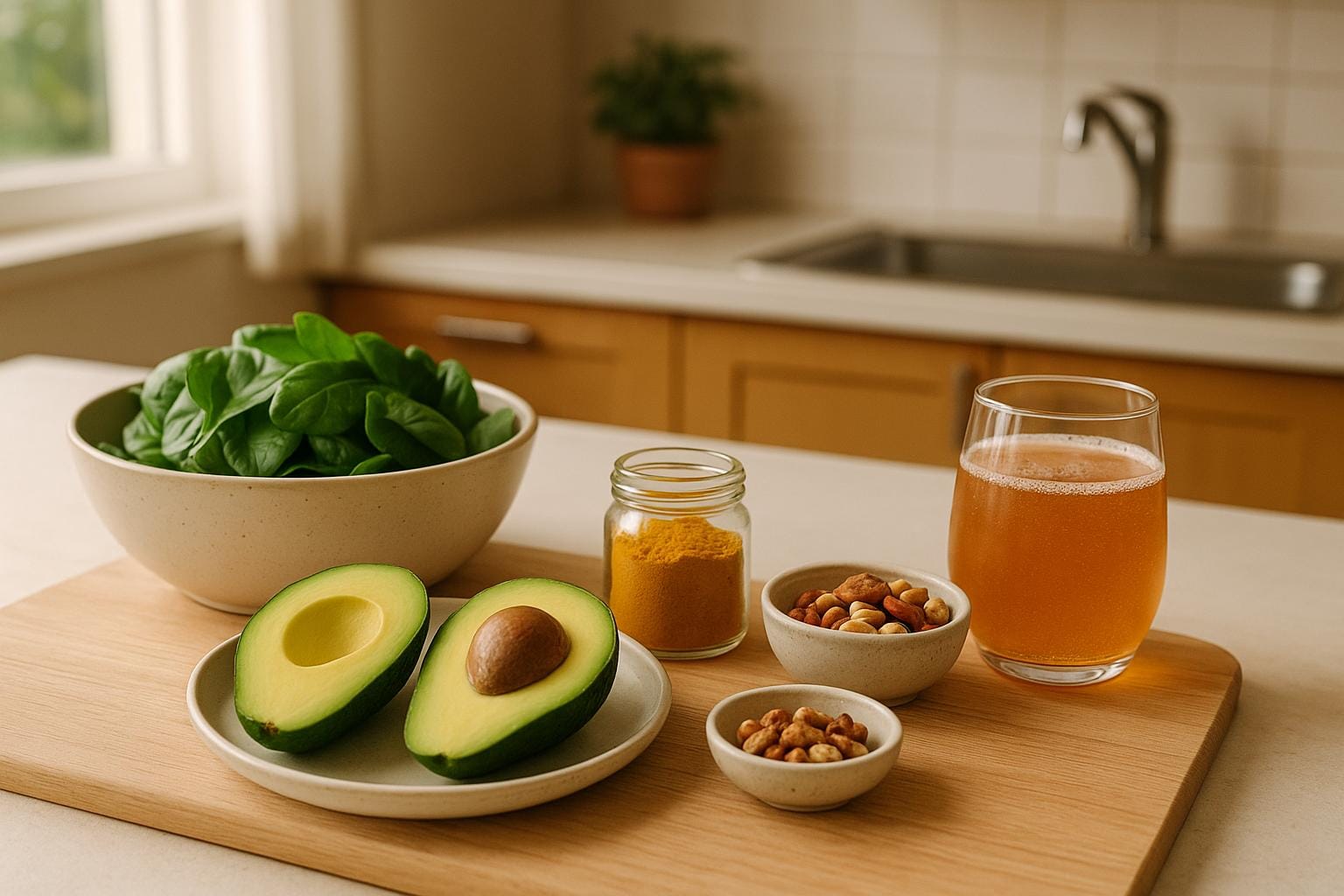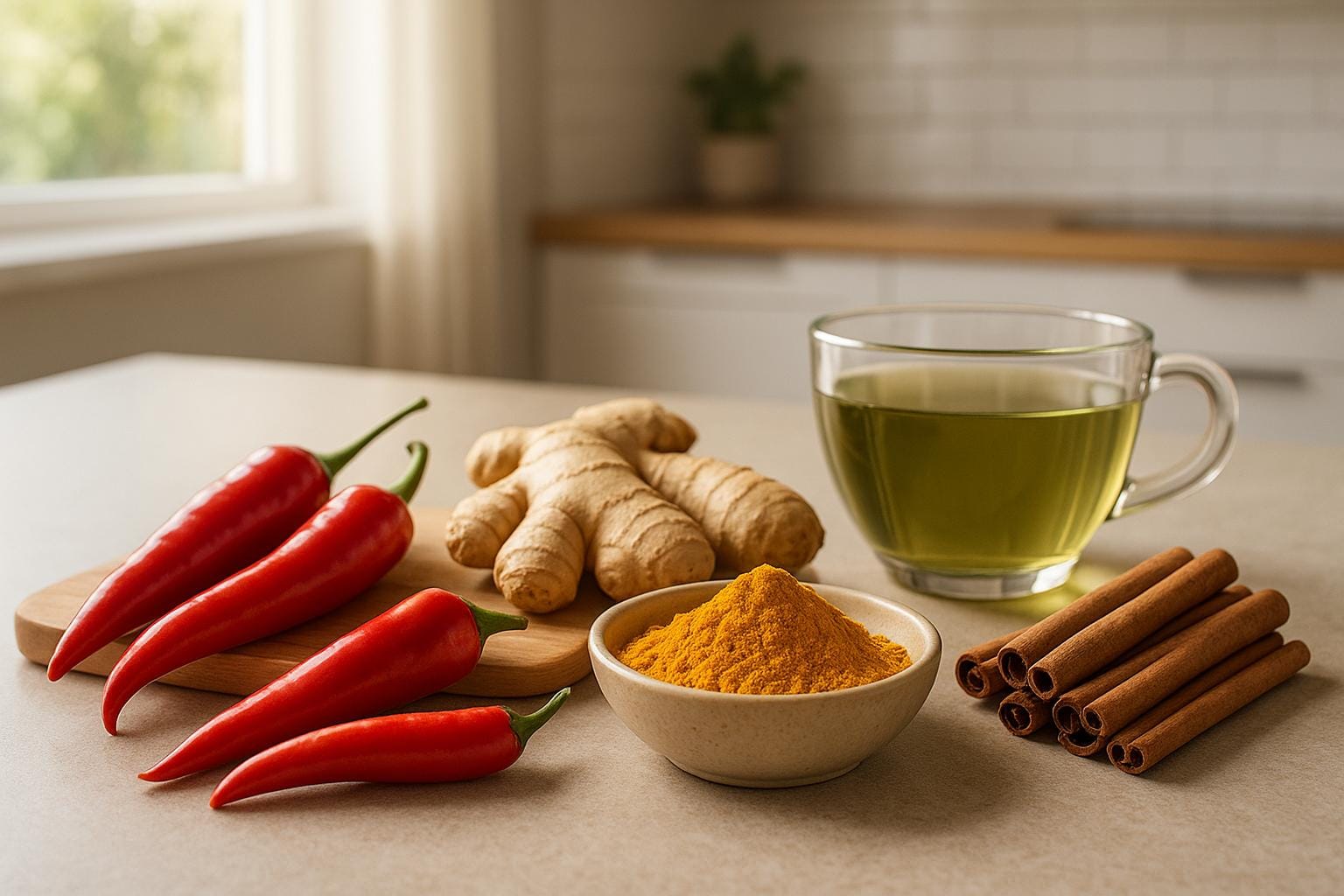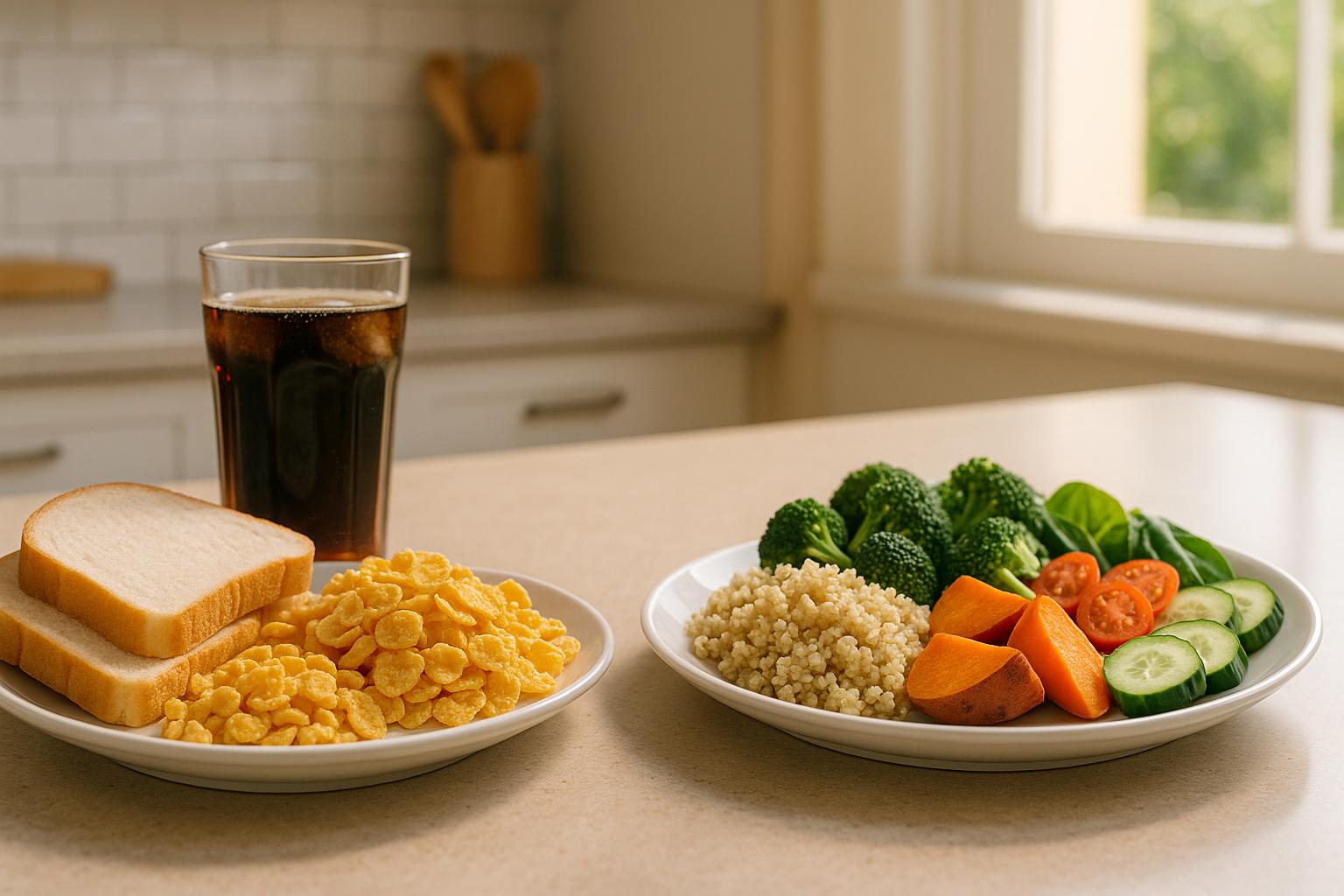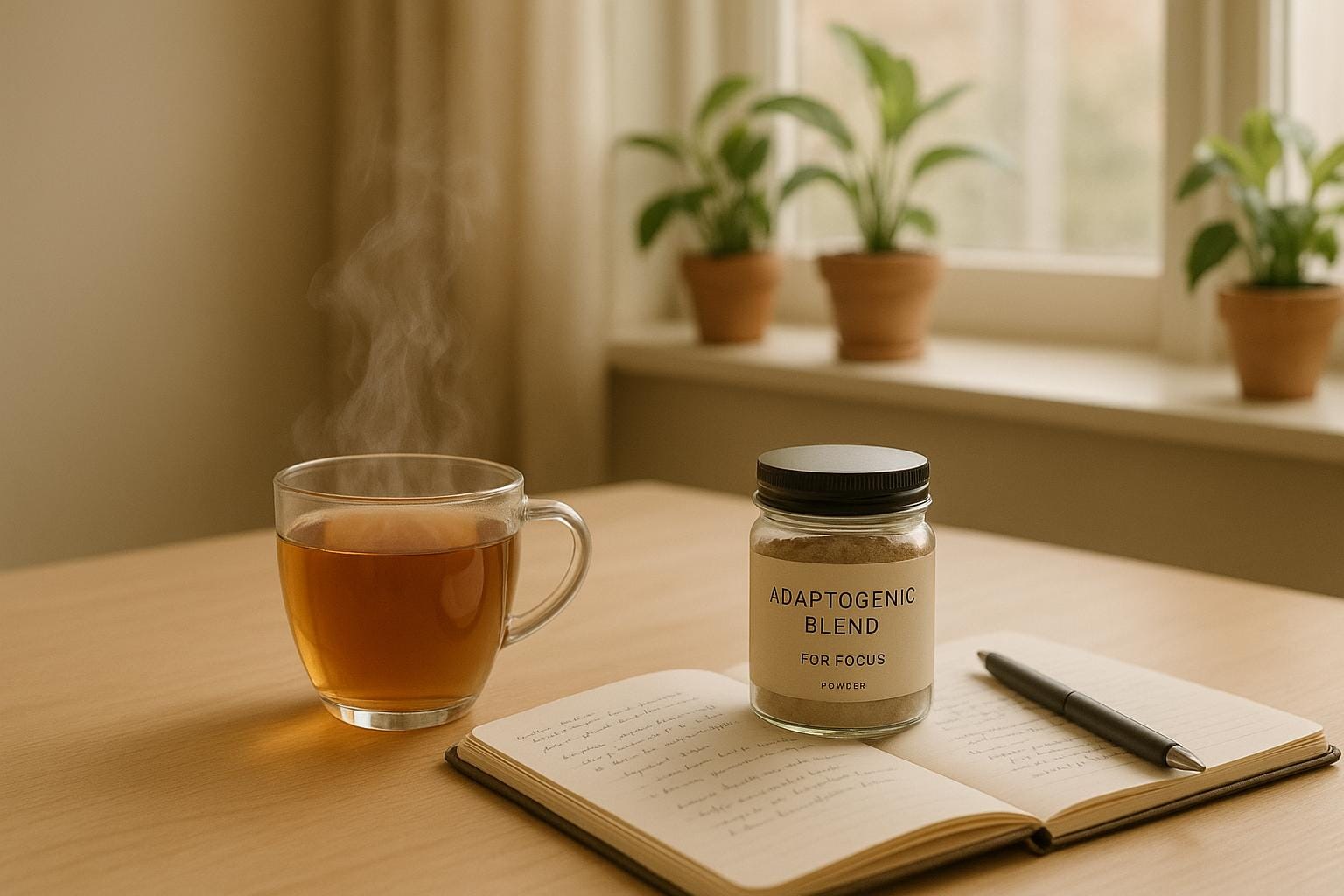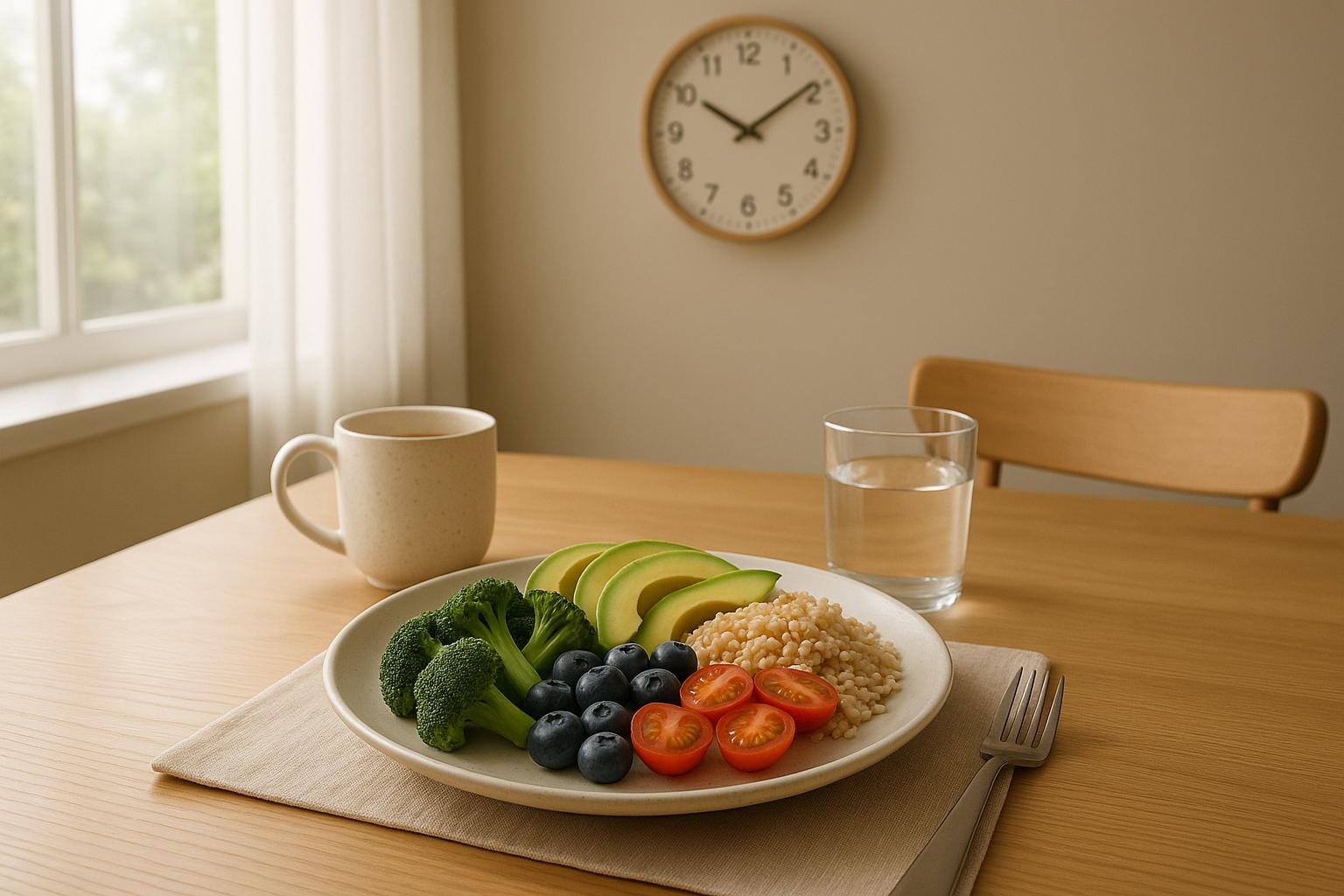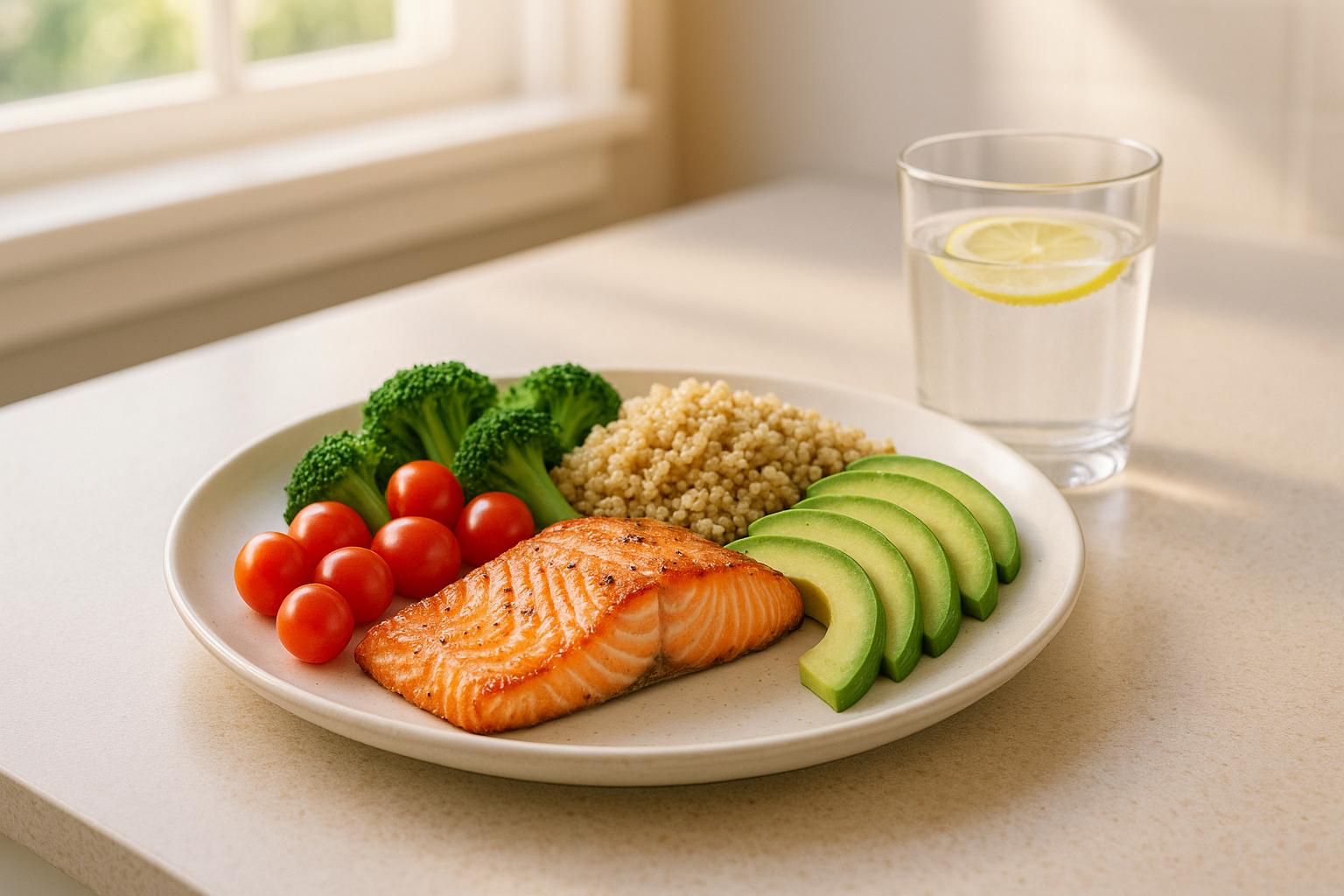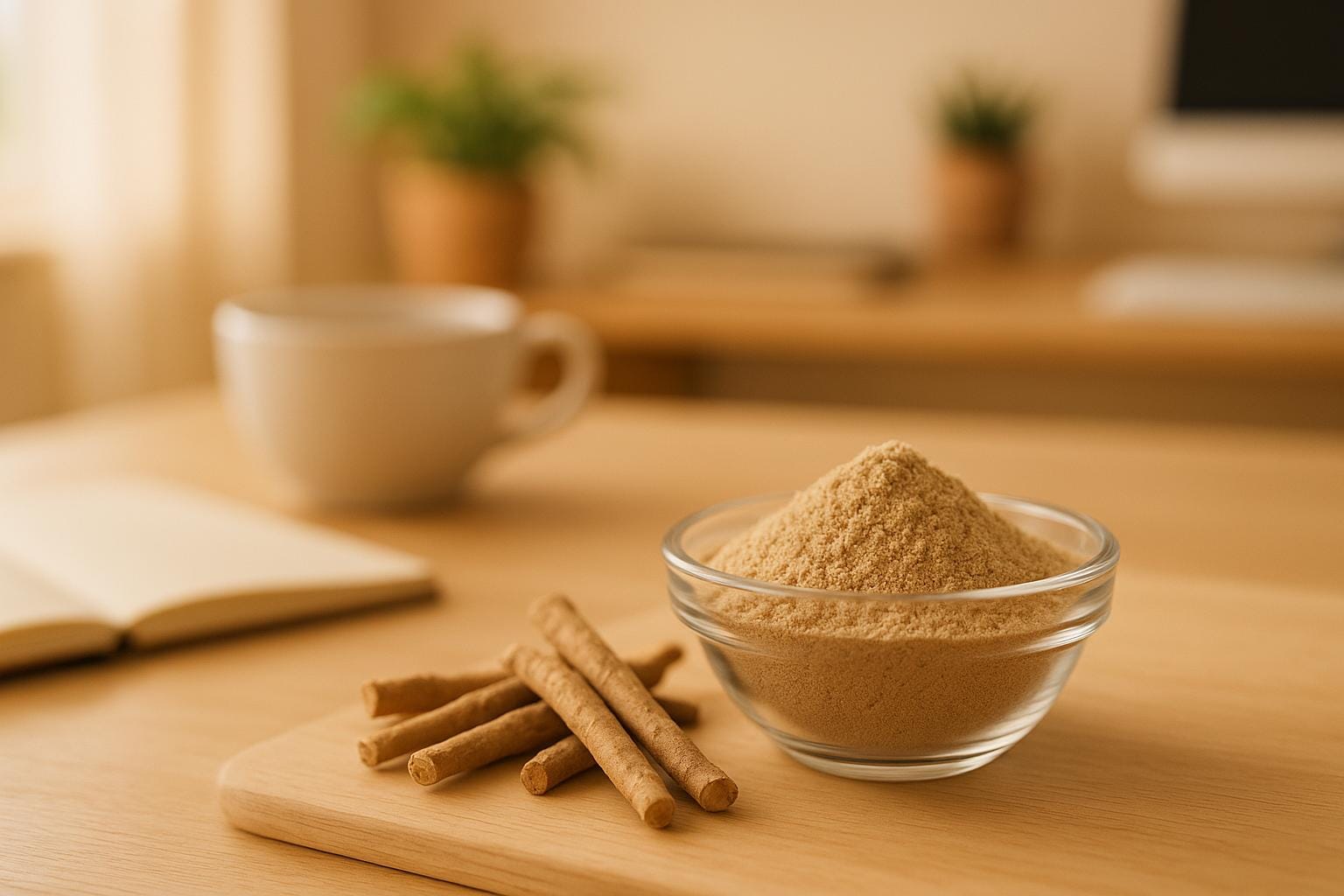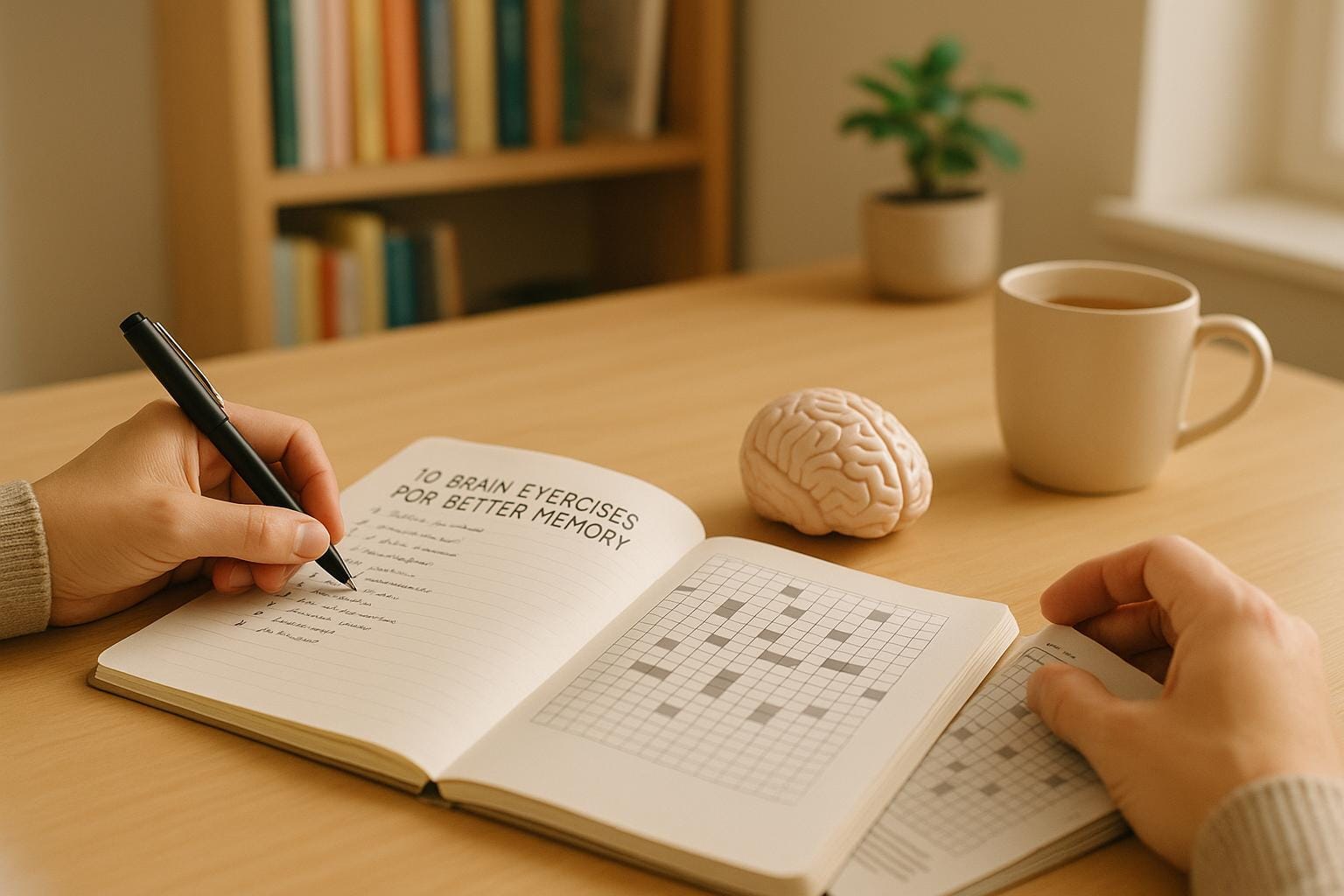Did you know your gut health can directly affect your stress levels? The gut-brain axis is a two-way communication system between your digestive system and brain, influencing mood, digestion, and stress. Here’s how to use food to support this connection and reduce stress:
- Probiotics: Yogurt and kefir boost gut bacteria and regulate mood.
- Prebiotics: Garlic and onions feed good gut bacteria and lower stress hormones.
- Omega-3s: Salmon and walnuts improve brain function and reduce inflammation.
- Antioxidants: Dark chocolate and green tea protect cells and calm the mind.
- Key Nutrients: Turkey, eggs, spinach, and pumpkin seeds aid neurotransmitter production.
- Superfoods: Leafy greens and liver strengthen gut lining and regulate cortisol.
Best + Worst Foods for the Gut-Brain Connection
What is the Gut-Brain Connection?
The gut-brain axis is a two-way communication system linking your digestive system and brain. This connection plays a key role in understanding how certain foods can help reduce stress.
Your gut is home to billions of microorganisms that send signals to your brain through three main pathways:
-
Nervous System Communication
The gut’s enteric nervous system, often called the "second brain", connects to the brain via the vagus nerve. This link can influence mood and stress levels. -
Immune System Interaction
The gut’s immune cells produce compounds that regulate inflammation, which impacts both physical and mental health. -
Hormonal Signals
Gut microbes help produce neurotransmitters like serotonin, dopamine, and GABA. These chemicals directly affect mood and stress management.
Together, the nervous, immune, and hormonal systems work to support overall well-being. However, factors like a poor diet, chronic stress, or illness can disrupt this balance, leading to a cycle of worsening gut health and stress. Keeping your gut microbiome balanced is essential for producing the right levels of neurotransmitters and maintaining mental health.
This is why eating nutrient-packed, anti-inflammatory foods can improve gut health and help manage stress effectively.
This article is for informational purposes only and is not intended as medical advice. Always consult a healthcare professional before starting any new fitness or wellness routine.
1. Yogurt and Kefir
Yogurt and kefir are fermented dairy products packed with live probiotics that help maintain a healthy gut. A well-balanced gut microbiome plays a key role in digestion and overall health. These foods also support the gut-brain connection, which can make a difference in managing stress.
Supports Mood Regulation
The probiotics in yogurt and kefir can boost the production of neurotransmitters like serotonin, which is closely linked to mood. The healthy bacteria in these foods create conditions that encourage the production of compounds that help regulate emotions.
Helps Manage Stress Hormones
A healthy gut microbiome can also help keep stress hormones in check. Eating yogurt or kefir regularly may support the balance between gut health and mental well-being, making them a natural way to address stress.
This article is for informational purposes only and is not intended as medical advice. Please consult a healthcare professional before starting any new fitness or wellness routine.
2. Garlic and Onions
Garlic and onions are more than just kitchen staples - they play a role in strengthening the gut-brain connection, helping to ease stress. These vegetables contain compounds that promote both mental and digestive health.
A Boost for Gut Health
Garlic and onions are rich in prebiotic fibers like fructooligosaccharides (FOS) and inulin, which feed beneficial gut bacteria. A 2022 study in Nutrients found that garlic increased gut microbial diversity by 15%, which can improve the body’s ability to handle stress.
"Garlic and onions are unsung heroes for the gut-brain axis. Their prebiotics and antioxidants create a dual action - calming the gut and, in turn, the mind", says Dr. Emily Carter, a nutritional psychiatrist.
Helps Manage Stress Hormones
These vegetables also contain sulfur compounds, such as allicin, which help regulate stress hormones. A 2023 study in the Journal of Psychopharmacology revealed that eating two garlic cloves daily reduced cortisol levels by 20%. Onions, on the other hand, are rich in quercetin, an antioxidant that helps reduce oxidative stress in the body.
Packed with Brain-Boosting Nutrients
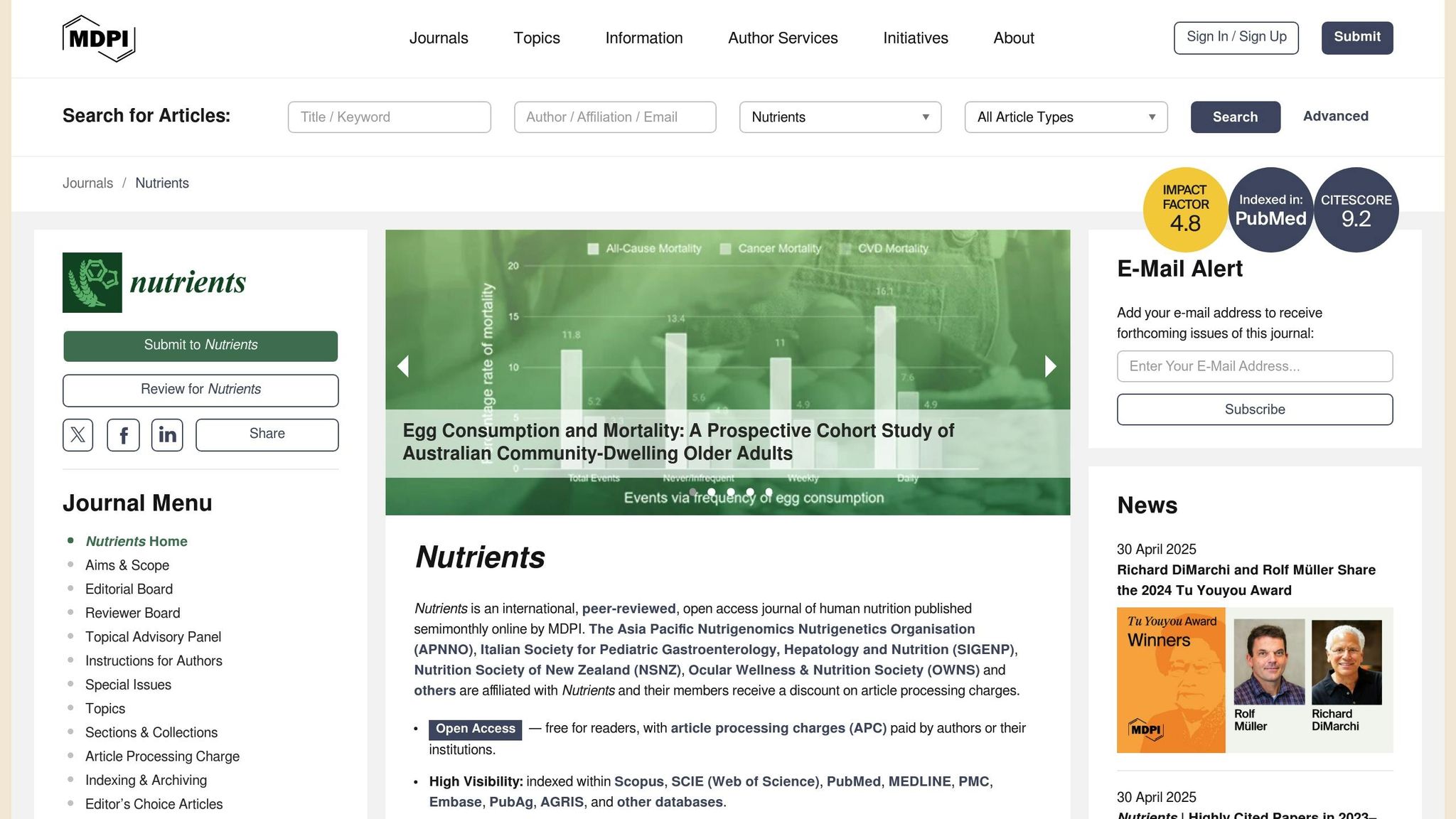
Garlic and onions provide important nutrients that support brain function:
| Nutrient | Found In | Benefit for the Brain |
|---|---|---|
| Selenium | Garlic | Protects brain cells |
| Quercetin | Onions | Supports brain adaptability |
| Vitamin B6 | Garlic | Helps with neurotransmitter production |
To get the most out of garlic and onions:
- Crush fresh garlic and let it sit for 10 minutes before cooking to activate allicin.
- Sauté onions lightly (no more than 5 minutes) to retain their quercetin content.
- Try garlic-infused oil if raw garlic is too harsh on your stomach.
These tips show how garlic and onions can contribute to gut and brain health, setting the stage for other foods that also support the gut-brain axis.
This article is for informational purposes only and is not intended as medical advice. Please consult a healthcare professional before starting any new fitness or wellness routine.
3. Salmon and Walnuts
Salmon and walnuts are packed with nutrients that benefit both your brain and gut. Rich in omega-3 fatty acids, they help maintain brain health by supporting its structure and functions. They also contain antioxidants that shield brain cells from oxidative damage, which can impact overall mental well-being.
These foods play a role in improving neurotransmitter activity, which is key for managing mood and stress. Thanks to their anti-inflammatory properties, salmon and walnuts help bridge the connection between digestive health and mental wellness. An article on fitup.co, titled "How Anti-Inflammatory Foods Reduce Stress," delves into how these nutrients contribute to a balanced diet and stress reduction.
Adding salmon and walnuts to your meals is not only tasty but also a simple way to support your brain and gut health at the same time.
This article is for informational purposes only and is not intended as medical advice. Please consult a healthcare professional before making any changes to your diet or wellness routine.
4. Dark Chocolate and Green Tea
Dark chocolate and green tea can support the gut-brain connection thanks to their polyphenols, which have antioxidant and anti-inflammatory properties. These compounds help protect cells and manage inflammation, adding to the stress-relief benefits of other foods we've mentioned.
For the best results, go for dark chocolate with a high cocoa content - it’s packed with more antioxidants. Similarly, opt for high-quality green tea to get the most polyphenols. While scientists are still studying their exact effects on gut health, including these in your diet can be a helpful step toward supporting your gut-brain connection.
This article is for informational purposes only and does not provide medical advice. Always consult a healthcare professional before making changes to your wellness routine.
5. Turkey and Eggs
Turkey is a source of tryptophan, while eggs provide choline - both crucial for neurotransmitter production and the connection between the gut and brain.
Tryptophan from turkey helps produce serotonin, a neurotransmitter that influences mood, sleep, appetite, and gut movement. Eggs add choline to the mix, which is needed to create acetylcholine, a neurotransmitter important for memory and overall brain function. Together, these nutrients play a key role in supporting the communication between your gut and brain.
This pairing lays the groundwork for incorporating other foods that help maintain a healthy gut-brain connection.
This article is for informational purposes only and is not intended as medical advice. Please consult a healthcare professional before starting any new fitness or wellness routine.
6. Spinach and Pumpkin Seeds
Spinach and pumpkin seeds play a role in supporting the connection between the gut and brain. Spinach is rich in fiber, which helps digestion and promotes healthy gut bacteria. Pumpkin seeds also contain fiber, offering more nourishment for these microbes.
These foods go beyond digestion by helping with neurotransmitter production. Pumpkin seeds are a source of magnesium, a mineral that supports serotonin production - key for mood regulation.
They also provide nutrients essential for brain health. Spinach is packed with antioxidants and vitamins that protect brain cells, while pumpkin seeds deliver zinc, which supports cognitive function and overall brain health.
Add spinach to your smoothies or salads and try sprinkling pumpkin seeds on yogurt or roasted vegetables for an easy nutritional boost.
This article is for informational purposes only and is not intended as medical advice. Please consult a healthcare professional before starting any new fitness or wellness routine.
7. Leafy Greens and Liver
Gut Health
Leafy greens like kale pack 2.4–3.6g of fiber per cup, which supports beneficial gut bacteria. Liver, on the other hand, is loaded with vitamin A (6,582 IU per 3 oz serving), essential for maintaining a strong gut lining and reducing inflammation.
Stress Regulation
Kale is rich in magnesium, offering 157mg per cup when cooked, while liver provides 3.6mg of vitamin B5 per 3 oz serving. Together, these nutrients help regulate cortisol levels and support adrenal health.
"B5 deficiency can impair stress response, making liver a smart addition during high-pressure periods", says nutritionist Dr. Emily Stone.
This balance also aids neurotransmitter production, which is crucial for maintaining a stable mood.
Neurotransmitter Production
Liver is a great source of choline, with 356mg per 3 oz serving, which is key for producing acetylcholine. Research published in the Journal of Psychopharmacology in 2024 found that adults with higher choline intake had 18% lower rates of anxiety.
Brain Health
These foods are packed with nutrients that benefit brain function:
| Nutrient | Source | Amount | Brain Benefit |
|---|---|---|---|
| Vitamin K | Kale | 444mcg/cup | Protects cognitive function |
| Iron | Beef liver | 5.2mg/3 oz | Reduces brain fog |
| B12 | Beef liver | 71mcg/3 oz | Supports nerve health |
For the best results, aim for 1.5–2 cups of cooked greens daily and 3–4 oz of liver weekly. A 2022 UCLA study found that people who ate leafy greens three or more times a week reported 24% lower stress levels. However, pregnant women should limit liver intake due to its high vitamin A content, and individuals on blood thinners should consult their healthcare provider before consuming vitamin K–rich greens.
These foods work together to strengthen the gut-brain connection, complementing other dietary choices discussed earlier.
This article is for informational purposes only and is not a substitute for medical advice. Please consult a healthcare professional before making changes to your diet or wellness routine.
How These Foods Lower Stress
The foods mentioned earlier help reduce stress by working through specific nutrients that regulate neurotransmitters, promoting a sense of calm and balance.
Probiotic Power
Fermented foods like yogurt and kefir are packed with beneficial bacteria that support the gut-brain connection, helping your body respond to stress more effectively.
Prebiotic Support System
Foods like garlic and onions contain prebiotic fibers, which improve gut health and, in turn, help manage stress levels.
Polyphenol Benefits
Dark chocolate and green tea are loaded with polyphenols, which reduce inflammation. This not only boosts your mood but also helps lower stress through the gut-brain link.
Up next, learn how to easily incorporate these stress-relieving foods into your daily meals.
This article is for informational purposes only and is not intended as medical advice. Please consult a healthcare professional before making any changes to your diet or wellness routine.
Simple Ways to Add These Foods to Your Meals
Adding gut-friendly foods to your meals can help improve neurotransmitter production and make stress easier to handle. Here’s how you can include them in your daily diet without much hassle.
Quick and Easy Breakfast Ideas
Start your day with a power breakfast bowl: mix Greek yogurt with chopped walnuts, a drizzle of honey, and fresh berries. Another option? Spread mashed avocado on whole-grain toast, add smoked salmon, and sprinkle with everything bagel seasoning.
For a make-ahead option, try overnight oats. Combine rolled oats, milk, and chopped walnuts in a jar. Let it sit in the fridge overnight, then top with fresh fruit and Greek yogurt in the morning.
These breakfast ideas can easily set the tone for a gut-healthy day.
Lunch Solutions
Sheet Pan Salmon Meal: Season salmon fillets with herbs and lemon. Roast them alongside broccoli and bell peppers at 400°F (204°C) for 20 minutes. It's a simple, nutrient-packed meal.
Mason Jar Salads: Layer your favorite salad ingredients in a jar for easy, fresh lunches during the week. Start with dressing at the bottom, followed by hearty vegetables, grains, and protein. Top it off with leafy greens to keep everything crisp.
Smart Snacking Strategies
5-Minute Salmon Salad: Combine canned salmon with Greek yogurt, fresh dill, and lemon juice. Serve it on whole-wheat crackers or wrap it in lettuce leaves for a quick, protein-rich snack.
Quick Sautéed Greens: Heat olive oil in a pan, add minced garlic, and toss in leafy greens like spinach or kale. Sauté for just 3–4 minutes, and you’ve got a nutrient-dense snack or side dish.
For even faster prep, stock up on pre-washed and pre-cut greens. You can also toss a handful of spinach or kale into your morning smoothie for an easy nutrient boost.
These simple meal and snack ideas are an easy way to support your gut-brain connection while promoting stress relief.
This article is for informational purposes only and is not intended as medical advice. Please consult a healthcare professional before starting any new fitness or wellness routine.
Quick Reference Food Guide
Here’s a handy guide summarizing serving ideas to help you include these foods in your daily meals.
Fermented Foods
Yogurt & Kefir
- Nutrients: Probiotics, calcium, B12
- Serving Suggestion: 1 cup (8 oz) of plain Greek yogurt or kefir daily
- Ideas: Add to morning parfaits, blend into smoothies, or use as a dip for vegetables
Sulfur-Rich Foods
Garlic & Onions
- Nutrients: Allicin, quercetin
- Serving Suggestion: 1-2 garlic cloves or ½ medium onion daily
- Ideas: Incorporate into sautéed vegetables, soups, or roasted dishes
Omega-3 Rich Foods
Salmon & Walnuts
- Nutrients: EPA, DHA, omega-3s
- Serving Suggestion: 2-3 servings of salmon (4-6 oz) per week; ¼ cup of walnuts daily
- Ideas: Grill salmon with vegetables or sprinkle walnuts over salads
Antioxidant-Rich Foods
Dark Chocolate & Green Tea
- Nutrients: Flavonoids, L-theanine
- Serving Suggestion: 1-2 squares (1 oz) of dark chocolate and 2-3 cups of green tea daily
- Ideas: Enjoy dark chocolate as an afternoon snack or sip green tea after meals
Protein-Rich Foods
Turkey & Eggs
- Nutrients: Tryptophan, B vitamins
- Serving Suggestion: 4-6 oz of turkey or 1-2 eggs daily
- Ideas: Use in breakfast scrambles, sandwiches, or main courses
Mineral-Rich Foods
Spinach & Pumpkin Seeds
- Nutrients: Magnesium, iron, zinc
- Serving Suggestion: 2 cups of raw spinach and 1 oz of pumpkin seeds daily
- Ideas: Toss into salads, blend into smoothies, or sprinkle as toppings
Nutrient-Dense Foods
Leafy Greens & Liver
- Nutrients: Folate, B12, iron
- Serving Suggestion: 2-3 cups of leafy greens daily; 3-4 oz of liver weekly
- Ideas: Sauté leafy greens as a side dish, add to stir-fries, or prepare liver pâté
This guide is designed to help you support your gut-brain health through simple, nutrient-packed choices.
This content is for informational purposes only and should not replace medical advice. Always consult a healthcare professional before making big changes to your diet or wellness routine.
Conclusion
We've explored how nutrition plays a role in the gut-brain connection and its impact on stress management. By making thoughtful food choices, you can support both your digestive and mental health, creating a pathway to better stress control.
Adding even one or two of these foods to your diet can help. For instance, try starting your day with a cup of Greek yogurt or pairing dark chocolate with green tea for an afternoon snack. These simple, steady habits can improve how your body manages stress over time.
This article is for informational purposes only and does not substitute for professional medical advice. Always consult a healthcare provider before making changes to your diet or wellness routine.
FAQs
How do probiotics and prebiotics help support the gut-brain connection to reduce stress?
Probiotics and prebiotics play a key role in nurturing the gut-brain connection, which can help reduce stress. Probiotics are beneficial bacteria that support a healthy gut microbiome, which in turn influences the production of neurotransmitters like serotonin - often called the 'feel-good' chemical. Prebiotics, on the other hand, are types of fiber that feed these good bacteria, helping them thrive.
Together, they promote better gut health, which has been linked to improved mood, reduced anxiety, and lower stress levels. Incorporating foods like yogurt, kefir, bananas, oats, and garlic into your diet can naturally support this process and enhance overall well-being.
Do omega-3 rich foods like salmon and walnuts help reduce stress right away, or do their effects take time?
Incorporating omega-3 rich foods such as salmon, walnuts, and flaxseeds into your diet can support stress reduction, but the benefits typically take time to manifest. Omega-3 fatty acids help reduce inflammation and support brain health, which can improve mood and lower stress levels over the long term.
While you may not notice immediate effects after a single meal, consistently including these foods in your diet can lead to noticeable improvements in your overall mental well-being over weeks or months. Pairing these foods with other stress-reducing habits, like mindfulness and regular exercise, can amplify the benefits.
How can I include more stress-reducing, gut-friendly foods in my diet?
Incorporating stress-reducing, gut-friendly foods into your daily meals can be simple and enjoyable. Start by adding fermented foods like yogurt, kefir, sauerkraut, or kimchi to support healthy gut bacteria. Include fiber-rich foods such as whole grains, fruits, vegetables, and legumes to nourish your gut microbiome. Foods high in omega-3 fatty acids, like salmon, walnuts, and flaxseeds, can also promote brain health and reduce stress.
For practical steps, plan your meals around these ingredients and keep healthy snacks like nuts or fresh fruit on hand. Experiment with recipes that combine these foods, such as a smoothie with yogurt, spinach, and flaxseeds, or a salad topped with grilled salmon and avocado. Small, consistent changes can make a big difference in supporting your gut-brain axis and overall well-being.


